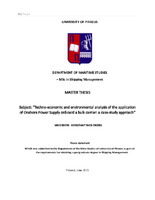| dc.description.abstractEN | The shipping industry plays a significant role in global greenhouse gas emissions, and efforts to reduce its environmental impact are crucial. This thesis investigates the potential of onshore power supply (OPS) to mitigate emissions by analyzing its impact on the Carbon Intensity Indicator (CII) of a bulk carrier vessel trading between Canada and China.
The study addresses several research questions, including how OPS affects the CII, whether OPS adoption alone can meet international emission reduction targets, and the financial implications for shipowners and operators considering fuel savings. Operational data from the specific vessel, MV BulkCarrier-N1, was collected from voyage reports and performance monitoring databases for the period from January 2021 to December 2022.
Two scenarios, IMO-Low and IMO-High, based on International Maritime Organization (IMO) trajectories, were developed to project future emission reduction targets. A Python model was then developed to analyze the impact of OPS and speed optimization on CIIs and fuel savings. The model incorporated inputs such as drydocking schedules, OPS installation timing, capital and operating expenses for OPS, annual revenues, speed ranges, and fuel prices.
The findings indicate that speed optimization alone can meet the IMO-Low targets until 2028 and the IMO-High targets until 2027. However, sustaining the desired efficiency levels beyond these years would require additional measures. When OPS was combined with speed optimization, the impact on CIIs was found to be minimal, primarily due to the relatively small contribution of the auxiliary engine's fuel consumption to the overall fuel usage.
Although OPS showed minor improvements in CIIs, it did contribute to fuel savings. The comparison between the IMO-Low and IMO-High scenarios revealed higher short-term financial gains under the more ambitious trajectory. However, achieving long-term sustainability and meeting ambitious emission reduction targets will necessitate the implementation of additional efficiency measures.
This study underscores the complex relationship between OPS adoption, speed optimization, and the achievement of international emission reduction goals. While OPS and speed optimization have potential benefits, they may not be sufficient on their own to achieve long-term sustainability in the shipping industry strategies and measures are needed such as the use of biofuels or alternative fuels (i.e. green methanol, ammonia etc.), to drive significant emissions reductions and ensure a more environmentally friendly shipping sector. | el |



